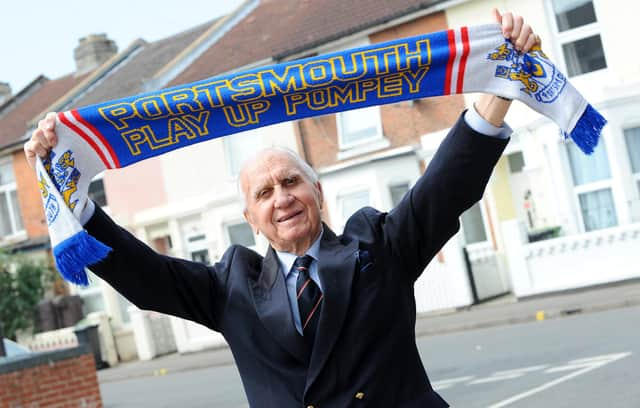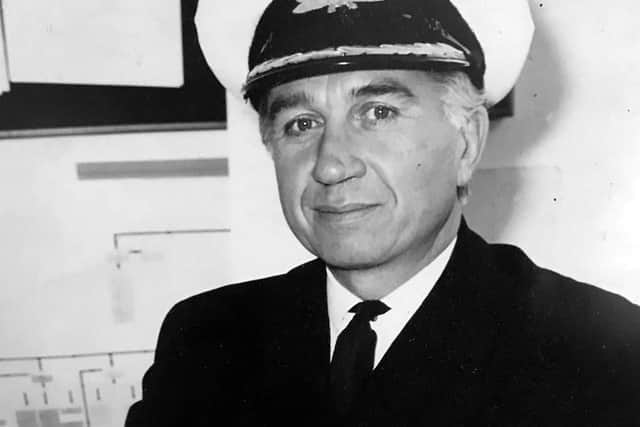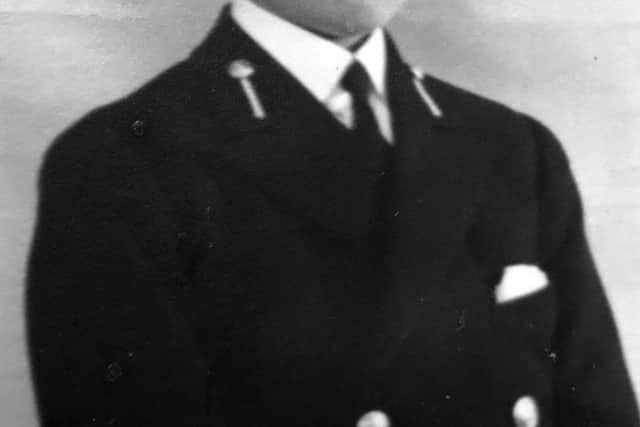Former Royal Navy captain Peter Hames looks at the origins of the navy


Captain Peter Hames now lives in Richmond-upon-Thames but was born in Victoria Road in 1929 and grew up in Southsea. The Royal Navy has always been a big part of Peter’s life and after attending Chivers School in Southsea he sat his exams and signed up as a naval cadet at the age of 14 in 1943.
Peter said: ‘I was meant to go to naval college in Dartmouth but the Germans had bombed it and so I ended up going to do my initial training in Chester. I just missed the Second World War as I first went to sea in 1946. While I was often at sea, I spent a lot of time at Whale Island where I trained as a gunnery specialist.’
Advertisement
Hide AdAdvertisement
Hide Ad

In total, Peter served for 41 years before retiring at the age of 55 having captained both HMS Plymouth and HMS Berwick.
‘I never had to fire a shot in anger but in many ways that shows the strength of the Royal Navy,’ said Peter.
After stepping down as captain in 1984, Peter has retained a strong connection with both the navy and comrades he served with.
‘I’m very proud to have been in the Royal Navy and to have served my life at sea – it still means a lot to me. Each year I’m part of a reunion with those who served on HMS Plymouth although we have had to postpone this year’s event due to coronavirus,’ said Peter.
Advertisement
Hide AdAdvertisement
Hide Ad

It’s this passion for the navy which led to him embarking on a three-month research project and production of a 16 page booklet, entitled The Origins of the Royal Navy 897-1500.
While Peter believes the Royal Navy as we know it began to take shape in the 17th century he was keen to delve further back into maritime history to look at where the seeds of naval defence were first sewn.
He said: ‘It started off with the Anglo-Saxon king, Alfred the Great, who was the first English king to start dealing with the raiding Vikings. He ordered the building a fleet of 60 oared boats, all of which were to be swifter, steadier and to sit higher than their shapely enemy vessels.’
However, this first large-scale maritime defence did not see battles takes place far from our shores.
Advertisement
Hide AdAdvertisement
Hide Ad

Peter added: ‘These state-of the art boats did not, as a matter of course, venture out to sea, which is hardly surprising when you think of the difficulty of attacking an enemy vessel with an oared boat in the lively English Channel.
‘As a result, Alfred’s boats normally operated in shallow and sheltered waters, intent on blocking river mouths and sending parties to seize beached enemy vessels and their crews engaged in attacking the locals.
‘There were some successes, including, surprisingly, one by Alfred himself, who went out to sea and captured or slayed the crews of two Danish boats while four other crews surrendered.’
Another key point cited by Peter in the evolution of the Royal Navy was during the reign of King Henry V and his construction of a fleet of ‘great ships’, the largest of which was the Grace Dieu, weighing in at 1,400 tonnes.
Advertisement
Hide AdAdvertisement
Hide AdIn July 1415, Henry’s fleet of 1050 ships set sail for France laden with an army of soldiers who went on to take part in one of the nation’s most famous victories – the Battle of Agincourt
Peter said: ‘Henry embarked on an expedition to give battle to the French on land. Nine thousand men and many horses were transported on this fleet of boats. It was some 529 years later and the D-Day landings when we saw a similar number of vessels crossing this same stretch of water.’
Now synonymous with the Royal Navy, the first mention of the evolution of Portsmouth as a naval stronghold came during the reign of Henry VII (1485-1509).
Peter said: ‘He set about building a gated dry dock in Portsmouth, costing £1,300, together with another £2,050 spent on fortifications, also in Portsmouth, and it’s during this period that we witness the city beginning to emerge as the first naval base in the country.’
Advertisement
Hide AdAdvertisement
Hide AdAfter completing his research, Peter delivered a presentation to the Richmond Local History Society, although he was left ‘disappointed’ at having to deliver it via Zoom due to coronavirus restrictions. After a ‘few days rest’, Peter would now like to follow up his research by looking at the period 1500 to 1700.
‘I hope I can do the next stage as there is a fascinating story tell. Although after the time it has taken to put this first piece together I’m not sure if my wife is quite so keen,’ said Peter.
Whether or not his second booklet comes to fruition, Peter believes the Royal Navy will continue to play a pivotal role in both national and global affairs.
Peter said: ‘We will always need a navy. After all we are an island and need to look after our shores. At one point we had the largest navy in the world.’
A message from the Editor, Mark Waldron
Thank you for reading this story. The dramatic events of 2020 are having a major impact on our advertisers and thus our revenues.
The News is more reliant than ever on you taking out a digital subscription to support our journalism. You can subscribe here for unlimited access to Portsmouth news and information online.
Every subscription helps us continue providing trusted, local journalism and campaign on your behalf for our city.
Comment Guidelines
National World encourages reader discussion on our stories. User feedback, insights and back-and-forth exchanges add a rich layer of context to reporting. Please review our Community Guidelines before commenting.